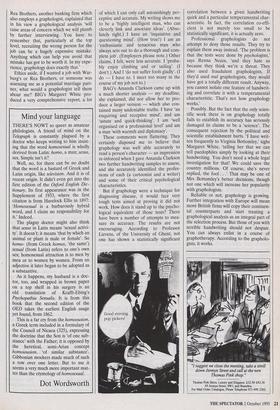Mind your language
THERE'S NOWT so queer as amateur philologists. A friend of mind on the Telegraph is constantly plagued by a doctor who keeps writing to him insist- ing that the word homosexual is wholly derived from Latin: homo, a man; se_rars, sex. Simple isn't it?
Well, no, for there can be no doubt that the word is a bastard of Greek and Latin origin, like television. And it is of recent origin. It didn't even get into the first edition of the Oxford English Dic- tionary. Its first appearance was in the Supplement of 1933, where the first citation is from Havelock Ellis in 1897: 'Homosexual is a barbarously hybrid word, and I claim no responsibility for it.' Indeed.
The plaguy doctor might also think that sews in Latin means 'sexual activi- ty'. It doesn't; it means 'that by which an animal or plant is male or female'. So homo- (from Greek homos, 'the same') sexual (from Latin) refers to one's own sex; homosexual attraction is to men by men or to women by women. From an adjective it later began to be adopted as a substantive.
As it happens, my husband is a doc- tor, too, and wrapped in brown paper on a top shelf in his surgery is an old translation of Krafft-Ebing's Psychopathia Sexualis. It is from this book that the second edition of the OED takes the earliest English usage yet found, from 1862.
This is a far cry from the homoousion, a Greek term included in a formulary of the Council of Nicaea (325), expressing the doctrine that the Son is 'of one sub- stance' with the Father; it is opposed by the heretical, semi-Arian concept homoiousion, 'of similar substance'. Gibbonian mockers made much of such a row over one letter. But to me it seems a very much more important mat- ter than the etymology of homosexual.
Dot Wordsworth


















































 Previous page
Previous page